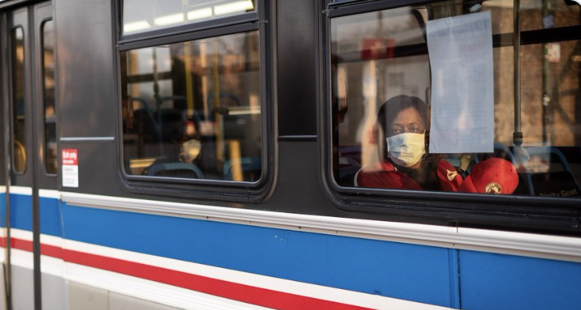A new group of advocates has joined the Active Transportation Alliance in its quest to push for affordable, speedy, and reliable bus service in Chicago. Armed with a deep commitment to community organizing and public service, Active Trans’ new Bus Organizing Fellows have been working to understand how to improve bus service during the COVID-19 pandemic for essential workers.
Since March, the fellows — LaCreshia Birts, Rylen Clark, and Jamaine Gooding — have been conducting online surveys with essential workers from historically marginalized communities who depend on public transit to get to their jobs. The survey examines the demographics of these workers, the condition of the buses, and the speed and reliability of the routes they take.
With that information, the fellows plan to work with community leaders, neighborhood nonprofits, and government officials on the West and South Sides of Chicago to develop a community informed report of recommendations. It will outline how to enhance bus service and reliability for these essential workers, how to make the buses safe, and the funding needed to implement these changes. Active Trans will present the agenda to the Chicago City Council and other elected and agency officials.
The Bus Organizing Fellows program will help the fellows further hone their advocacy skills as well sharpen their understanding about how public transit plays a role in creating equitable, vibrant communities.
For example, LaCreshia Birts, who is studying public policy at the University of Illinois at Chicago, has extensive community organizing experience. She previously served as a program coordinator for the YMCA Youth Safety Violence Prevention and she served as lead community ambassador at BUILD Chicago, where she coordinated community outreach and community wellness programs and events.
Having grown up on the West Side of Chicago without car, she regularly rode buses and trains, which she says allowed her to see racial and class divisions up close. “In many instances, you can tell the demographic and income level of neighborhoods by how well their CTA train and bus stations are maintained and even by the frequency of the busses,” she says. “This is something that concerns me. If the majority of transit riders are low-income and working-class people, why is the upkeep and maintenance of the transit stations in our neighborhoods so poorly maintained?”
Rylen Clark is also passionate about accessible, affordable public transportation. The Chicago native has worked as a youth and peer leader at Center on Halsted, La Casa Norte, and Howard Brown Health Center, helping at-risk youth with health, housing, and employment.
As a Bus Organizing Fellow, Clark is putting their outreach, relationship-building, and communication skills to work to support the needs of essential workers that must use public transit regularly. That includes how to implement affordable fares, ways to reduce bus bunching, and how to practice effective social distancing on buses. Clark says: “Chicago is known to have a very expansive public transit system, so the less vital aspects of bus riding are often ignored. This is a very misguided view.”
Jamaine Gooding knows all too well how important a reliable public transit system is to a major metropolitan area like Chicago. Originally from Brooklyn, N.Y., Gooding was a regular user of New York City’s transit system. When he came to Chicago to pursue his master’s degree in sustainable urban development at DePaul University, he was impressed with the city’s large-scale public transit system. But he also experienced firsthand some of its faults, including bus bunching and slow service. So he is looking forward to advocating for better bus service as part of the Bus Organizing Fellows program: “Organizing around quicker and more frequent buses are critical in every neighborhood, especially marginalized ones,” he says.
Gooding brings experience in transportation and human rights to the Active Trans program. He most recently was a real estate intern at Metra, where he reviewed deeds, other legal documents, and land maps of the agency’s acquired properties. He was previously a fellow at the Colin Powell School for Civic and Global Leadership, studying trends and affairs in human trafficking.
Stay tuned for blog posts from our fellows as they share the stories of essential workers that must use public transit during the COVID-19 pandemic.
Photo credit: Chicago Tribune

